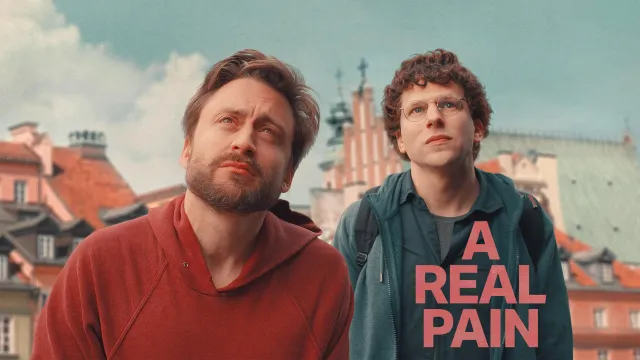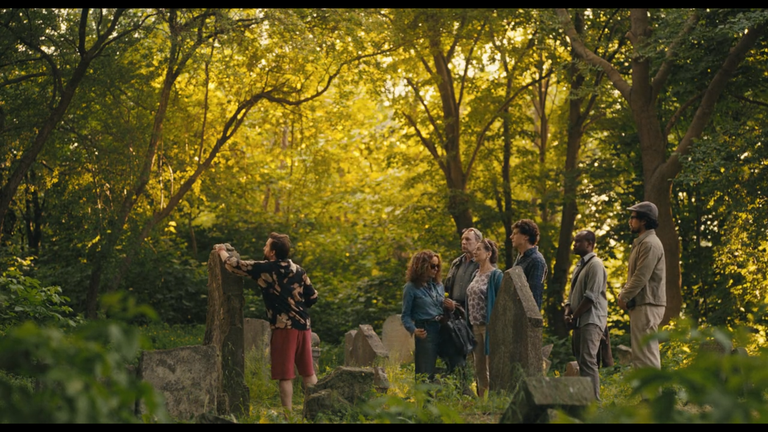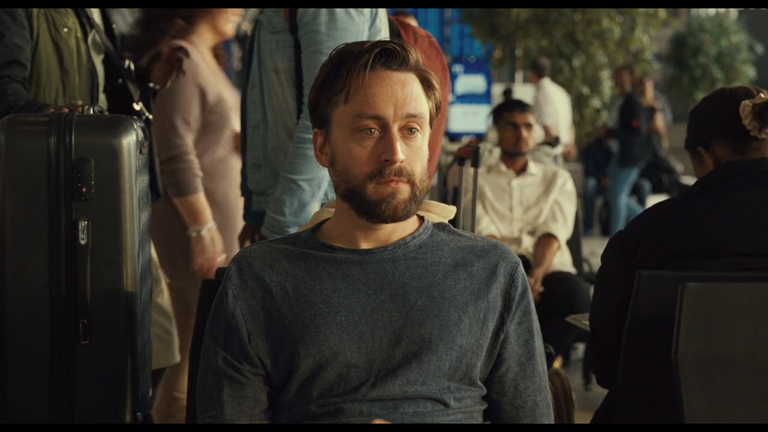Succession was, for me, one of those shows that is so great you don't just devour that, but go on to keep an eye out for the cast years after. It's enough to see one of the main cast on the poster for me to get excited for a film, and as it happened, the premise of A Real Pain appealed as well.
Warning: Spoilers ahead.

I took this particular photo from here, but credits for all the promo pics, obviously, Searchlight Pictures.
The film follows David and Benji, American cousins reeling from the death of their matriarchal Jewish grandmother, who decide to join a Jewish history tour through Poland (her birthplace) to honor her. It's a fairly predictable set-up - there's the straight-and-narrow Dave (Jesse Eisenberg), quiet, polite, loner, and then, there's Benji (Kieran Culkin). Benji's the life of the party. As Dave tells him in one particularly moving scene, it's enough for Benji to walk into a room for everyone to light up. He's charismatic, funny, compassionate, but not all the time. He's the sort who connects with and feels for you, but it costs. It's always a cost to feeling and honoring your emotions, because you don't get to pick and choose, not really.
That's an issue between the two throughout the movie - Benji keeps admonishing his cousin - "You used to feel everything" he keeps telling him. Where Dave grew up, Benji remained a feeler, in some ways a kid, excitable but also ruled by his emotions entirely. I felt for him a great deal. I'm just like that.
As the tour progresses, Benji oscillates between fun/easy-going and heavy/angry. He berates the tour guide for filling them with facts so much that they don't actually have the space to feel. Understandable, perhaps, on a tour of that nature, but it'd also be understandable for Benji to be the first to avoid big feelings - we find out a bit later in the film Benji recently attempted suicide. That's the un-fun side of his personality - he has no family, lives with his mom still, is drifting a bit, no big job to speak of, and has recently lost the only person he was still really close to, his grandmother. The opposite in many ways of his cousin.
Benji is the classic picture of a man traversing a crisis. Someone who might be said to suffer from borderline personality disorder, or perhaps just depressed.The thing is, he is trying to make things nice because as is abundantly obvious throughout the movie, he feels for just about everybody else on the planet and wants them to have a nice time. When he notices a woman on the tour walking by herself, he goes be with her 'cause he doesn't want her to feel alone. He's this wonderfully complex character in an otherwise unremarkable film about grief (both on a personal and a larger scale).

There's a particularly poignant scene when, on the second day of the tour, the group is riding first class on a high-speed train through Poland. They're all just eating their fancy lunch, when Benji explodes, saying isn't anyone else bothered about the perverse irony and the entitlement of having their fancy foods and living their fancy lives as Jewish people on a train in Poland. What are we supposed to do, someone else argues, not eat our food or go on the train? After all, we paid for it.
It's an interesting observation on some very dark history, for sure, but it's also, I think, a slip of the mask. In truth, Benjj's not asking "how dare you", he's saying "how dare I". Somehow, even though he's living a much happier, more privileged life than his grandmother, he is still in constant pain. And like most people who are struggling, he counts that as a primary fault, also. How dare my stupid life hurt when others have it worse out there, or out back?
It's a question with profound resonance in our modern times, because although we are living in (in many ways) the best of times, depression, anxiety and a slew of other shades of suffering are all on the rise. How dare we? We don't feel entitled to our pain, especially in a world that either only acknowledges it superficially or else fetishizes it. If my life hurts, then it stands to reason I am the fuck-up, and whereas people of the past and all around are deserving of understanding, compassion, forgiveness even, I am not.
It's a common refrain for people struggling with issues of self-worth, depression, BPD, et cetera, and it's played out brilliantly. While the movie itself isn't a great film, it's worth it for the final scene. Arriving back in the US, Dave invites Benji back to his home, to dine with his family, but Benji refuses, saying he'll hang out at the airport a little longer (as he is in the beginning of the film). You meet the craziest people here, he tells Dave, like he's about to embark on one of the most fun rides of his life. We see Dave arrive home and be greeted by his small child and wife, but the movie closes with Benji, sitting in the airport aisle, smiling genuinely at people, leaning in, wishing he were a part of, but not quite saying anything.
There's this heartbreaking final shot of Kieran Culkin's extremely expressive eyes, and there's so much emotion, so much sorrow contained in them - it's fantastic. It's no wonder that, out of the nominations the film got, he was the only one to go home with a Golden Globe.

It's always surprising to me how these films conveying so much emotion can still be labeled as "comedic". Of course it's coated in laughs. If it were a drama talking so accurately about what it is to hurt, you'd go home wanting to kill yourself.
So yeah, it's well worth a watch.

The other two pics are screenshots by yours truly. :)
The rewards earned on this comment will go directly to the people( @davideownzall ) sharing the post on Reddit as long as they are registered with @poshtoken. Sign up at https://hiveposh.com. Otherwise, rewards go to the author of the blog post.
movies fans
I loved these actors in their roles. They always find a way to connect with the movie and in turn connect it with the audience.
This kind of script are the one who made cinema into masterpieces and pure art. My God what a film!